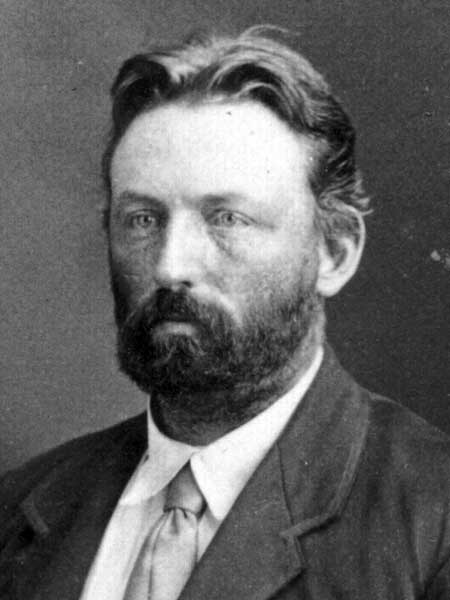John Christian Schultz had come to prominence by leading the “Canadian faction” opposing the Legislative Assembly of Assiniboia Led by Louis Riel. He invested in Selkirk and came to own the land that became Clandeboye, Manitoba and Superior Avenues. He built the first Merchants Hotel in 1887.

A Real Scallywag
After Louis Riel had negotiated Manitoba into Confederation as a full province, he and his Metis supporters were branded as “traitors” by the incoming Ontarians. The troops sent to quell Riel’s “Rebellion” harassed and assaulted the Metis. Leading them and urging them on was…J.C. Schultz!
After the fall of the Riel provisional government and the arrival of Wolseley’s troops from Ontario, Schulz took advantage of the chaos to create division and dissent among the people of the Red River.
Schultz used his connections and land holdings to gain political power, becoming the Member of Parliament for Selkirk-Lisgar. He was elected to the Parliament of Canada twice, and was appointed Senator and Lieutenant-Governor of Manitoba.
Schultz acquired vast holdings in both Winnipeg and Selkirk by buying lands from unsuspecting Metis farmers. He sided with Winnipeg’s ambition to become the capital city. In 1886 he became the publisher of the Nor’wester. It was through this publication that he broadcast his views opposing the HBC and his preference to annex to the new country of Canada.
Not surprisingly, he prevented Selkirk’s petitions and documents from being presented to a parliamentary committee looking into the route changes. In fact, he offered land and cash to the CPR to change its route to pass through Winnipeg instead of Selkirk.
He made a fortune when the CPR crossed into Winnipeg. When he was defeated at the polls, John A. Macdonald made him a Senator and then Lieutenant-Governor of Manitoba in 1886.
A False Title
When Schultz first arrived in the West he went from a bar keep and dry goods clerk to a doctor overnight. He had no official university doctorate, and much later, when records of his stated credentials were verified, he was found to have never graduated.
As it turned out, the occupation of a doctor was not as glamorous as it seemed to be so he soon shifted his attention to real estate. He earned his wealth by land speculation. He purchased land in the path of predicted railroads and he bought Red River land at low prices and sold it for higher prices.
Despite his shift in focus, held onto his doctor title because it communicated respectability and status. At the time, degrees could be purchased, forged, or printed with ease. Doctors were in short supply so not many were inclined to question their legitimacy. Schultz was a master at bluffing and used this skill to for his benefit, often at the expense of others.
Schultz was not a nice or an honest man. At his funeral in 1896, the wise and respected Sheriff of Assiniboia, Colin Inkster, remarked after hearing the eulogy “tis a pity we knew him!”
Schultz Avenue Collection

Sources
Selkirk the First Hundred Years, Barry Potyondi

